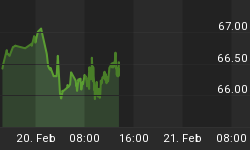There have been large and sometimes surprising moves in the three major currencies over the past 18 months - the Euro, Yen and Dollar. All three rose at different times during 2008-2009, but the Euro and Yen have stopped rising. As explained below, the Dollar should stop rising, and should begin to fall soon.
Currencies
I. The Euro - Through the middle of the summer of 2008 the Euro rose. As it rose, investors became even more negative on the Dollar and believed that the rise in popularity of the Euro meant that it could possibly become a second reserve currency. However, in July, despite weakening US fundamentals, the Euro began to fall after hitting a high of 1.60 as the euro-zone's weak fundamentals hurt the currency. As the Euro has continued to fall it is no longer considered to be a viable rival to the Dollar. This was the first major currency to stop rising (see below).

II. The Yen - As 2008 progressed and delevering took full force, the Yen moved into the spotlight. The carry trade is now common knowledge. Hedge funds and private investors alike were forced to unwind their short Japanese Yen positions, which helped the Yen become the best performing currency in 2008. The Yen rose not because of strong fundamentals but as a result of delevering. Similarly, delevering helped to propel the Dollar higher beginning last year although it did not rise against the Yen. Lately, the Yen seems to have topped out despite equity markets around the world hitting new lows. A few weeks ago investors would have expected new equity market lows also to translate into new highs for the Yen. However, the weak fundamentals of Japan have overtaken the forces of delevering, causing the Yen to weaken and become the second major currency to stop rising (see below).

III. The Dollar - The Dollar's rise has been the result of a safe haven perception and a delevering of seven years of short positions. In fact, the two forces created a positive feedback loop. Because the Euro and the Yen both started falling it is likely that the Dollar will also reverse course for the reasons discussed earlier and also due to global capital flows discussed below.
Global US Dollar Capital Flows
The weakening US economy in 2008 led to a shrinking of our trade deficit. The result was less US Dollars being sent around the world creating a tightening of global liquidity and helping to send the Dollar higher.
United States Trade Deficit: | |
2007 | $700Bn |
2008 | $677Bn |
2009 Est. | $300Bn |
| Sources: Commerce Department and Market Estimates | |
However, as the United States trade balance has improved, the budget deficit is now set to explode. Including the stimulus, it is expected that the budget deficit will be in the range of $1.8trn - $2.0trn in 2009. This is a deterioration of approximately $1.5trn in the budget deficit compared to just a $400bn improvement in the trade deficit.
United States Budget Deficit: | |
2007 | $162Bn |
2008 | $455Bn |
2009 Est. | $1.8 Trn - $2.0 Trn |
| Sources: 2009 United States Budget and Market Estimates | |
When the rest of the world gets fewer dollars from a shrinking trade deficit, the value of the Dollar strengthens. The US now is embarking on a path to an astronomically high budget deficit that will have the complete opposite effect. Instead of foreigners being flush with Dollars to re-invest in the United States, they are lacking Dollars at the very time that we need their Dollars the most - to fund the US government's deficit. This can only have one effect on the Dollar - that is for it to FALL.
The US Dollar should have been falling during the last 18 months as interest rates were slashed and our fundamentals were the worst in the world. Common sense always prevails, and anyone still expecting the Dollar to remain strong and deflation to be headline news is going to be shocked.
















